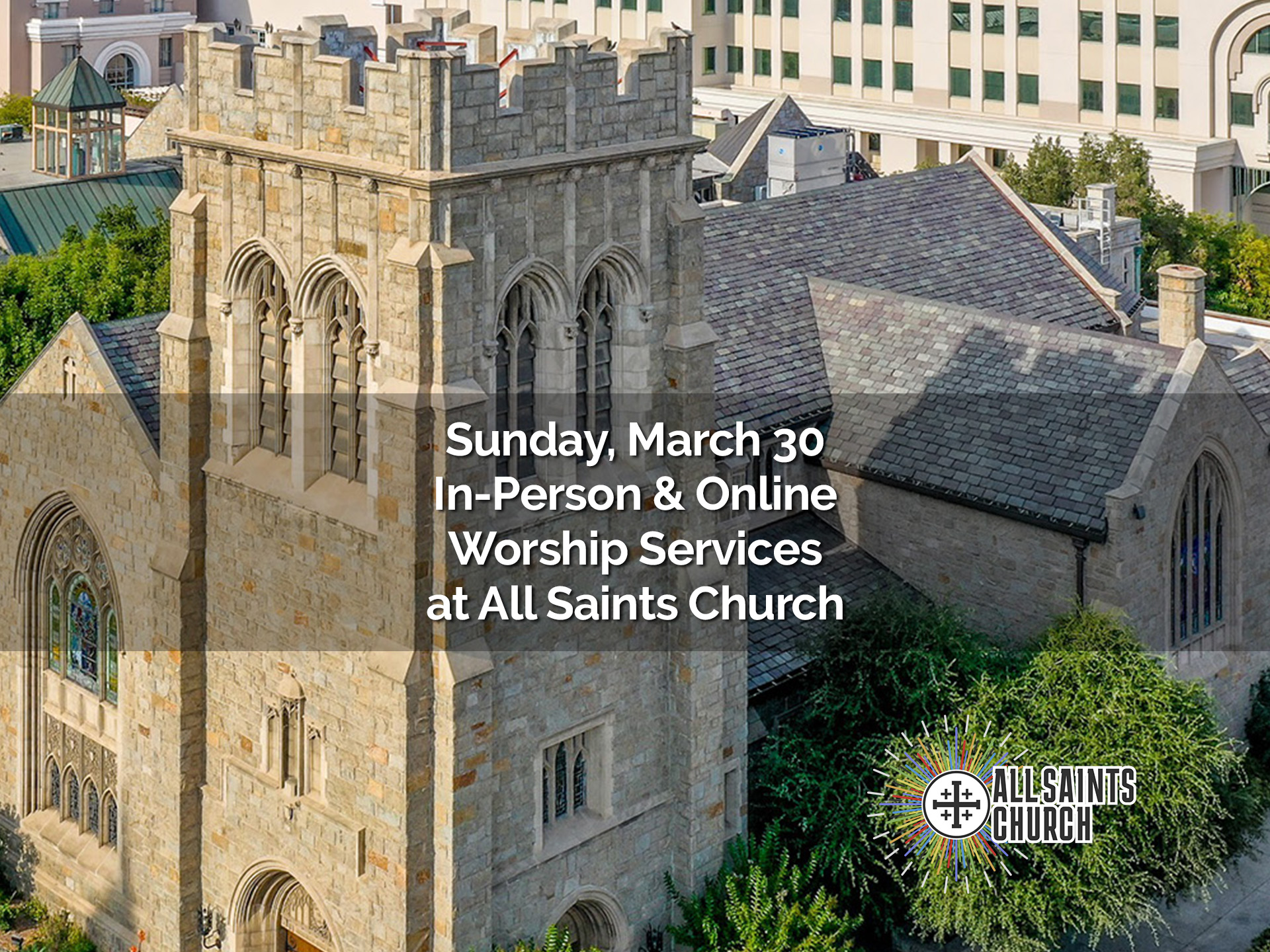Sermon preached by Sally Howard on Sunday, July 21 celebrating the Feast of Mary Magdalene.
=====
This week, I had a remarkable experience with one of our parishioners who is in hospice care due to the return of an aggressive metastatic cancer. A part of our community for many years, she first came to All Saints drawn by the prophetic voice we have on issues of peace and justice. The director of her hospice care has marveled, as have I, at her relative vitality and the length of her survival despite the odds and the gravity of her illness. This director recently asked her why she thought she was still alive.
She responded, “God knew I needed to become a better person while I’m still on this earth. You see, I’ve cared about peace and justice all of my life, and I’ve always known God loves every human being. But I’ve never really gotten to know anyone outside of my own circle until I needed hospice care. Now, interacting with my caregivers, hearing stories of their lives; I’ve gotten to know them. I know their names and the names of their families. Now when I hear the news, I’m not at a distance anymore. I see faces that look like and hear names that sound like these women that I have come to know and love, and it wrenches my heart. Through these women, God has given me one last opportunity to become more of who God wants me to be.”
Today’s gospel tells us a lot about how to live into our full humanity, to be more of who God desires us to be. Here we have a story of God’s ultimate proximity, a God who loves things by becoming them. A God who knows each of us intimately and calls us by name. It is also a story that illustrates the creative power we share with God, power rooted in proximity that expands compassion and connection while honoring difference. It is the kind of relationship power that heals the world and defies even death. God calls us to move beyond our own social location so that we can call each other by name.
Naming is an act of healing and restoration. When Jesus calls Mary by name, he reveals a new world and a new way of living in it. Jesus lives out of a non-competitive understanding of God. God is not threatened by the active independence of God’s creatures, but glorified and enhanced by a creature’s flourishing. God is a blazing flame whose drawing near does not consume but empowers us to our own authentic selves.
Thus in contrast to the social structure and religious norms around him, Jesus’ relationship with Mary Magdalene, and his public relationships with women in general, reveal his lack of fear of women and a strong interest in their flourishing. He was not threatened by women’s power, he was enhanced by their empowering. No word of disparagement passed his lips. He did not see women as a lesser class of human being and treated women with respect and tenderness. And that was not a one-way street. The women around Jesus were his friends, sometimes his teachers. Remember the Canaanite woman who helped Jesus grow beyond his tribal identity, altering his ministry and the world forever.
Jesus’ preaching audience was inclusive of women. He never set out one way of acting for men and another for women. He used images of the daily activities of women such as kneading bread, to illustrate the transformative action of God’s kindom. Maybe most striking is the way he honored women as symbols for the living God—a woman searching for a coin that was lost. Jesus even referred to himself in female imagery like a mother hen wishing to gather her chicks under her wing.
Jesus healed, exorcised, forgave and restored women to shalom, particularly those most in need: the recently deceased little girl, the widow whose son had just died. Both in words and deeds, Jesus used his power to heal individuals and to overturn the unjust ways that contributed to their lack of well-being. Jesus shows real strength that is the exact opposite of the racist patriarchy so prevalent in our country’s leadership today.
Mary was drawn to Jesus. We are told in Luke that Jesus healed Mary, by exorcising her of seven demons. The number seven was used in biblical literature to represent completion, as in the seven days of creation. We could say that seven demons meant that when Mary met Jesus, she was completely tormented and oppressed. Jesus restored Mary to wholeness and she joined his ministry, along with other women—Joanna and Suzanna- and so “many others” whose existence remains unknown, unnamed by the writers of the gospels.
It was Mary Magdalene with the women who kept vigil with Jesus at the cross, and therefore the women knew the location of the tomb. It was to Mary Magdalene that Jesus first revealed himself as the risen Christ, and whom he trusted to carry the resurrection proclamation to the world. She was the apostle to the apostles, known as a beloved friend and collaborator with Jesus. Jesus called her by her name.
Six hundred years later, the church renamed her as a prostitute, which overshadowed her important apostolic work ever since. Furthermore, by naming the torment from which she was healed “an evil expression of female lust”, the church mislabeled her and devalued women’s bodies and sexuality, all in one fell swoop of fake news.
Systems of domination always have ways of categorizing those who threaten their power. Does “Nasty woman” “unsexiest woman alive” “fat pig” ring a bell? Or how about “shit hole nation” or “broken crime infested country”? Words have the power to bless or to curse. When we use our language to curse, we dominate and colonize, devalue, distance and harm, and we encourage others to do the same. “Send her back” is not only a misogynous racist chant, it moves our nation away from the proximity fundamental to health and well-being. To our president, I say, we will send her back all right, right back to congress to do the work she and the Squad were elected to do!
When we use our power to name as a blessing, we confer the dignity of both autonomy and difference, while at the same time affirming that person’s full citizenship in the human family with full entitlement to respect, concern and care. When we name someone from God’s perspective, everyone belongs. There is no outside and no outsiders. This is what it means to name as a blessing. We use our power of language in sacramental communion with the world. To name as a blessing is to pay attention; to name as a blessing is to come close; to name in God’s name is to use one’s power to empower the flourishing of others.
What does this mean for us today here at All Saints? One thing it means, my friends is to continue expand your own use of your creative power through language to bless everyone in every place you are. To put aside fear and competition and embrace the truth that power used for and with others to enhance their flourishing ever increases our own. It means to see what is unique and positive in another person and to say it out loud, to call out in the world all that excludes, demonizes, and devalues others. For heaven and earth’s sake, don’t leave the proclamation of the good news to those who preach from the pulpit! It’s your good news of belovedness and God’s undefeatable power of love.
Secondly, seek out proximity. Jesus calls us to follow and to dwell in God’s loving presence, to go where there is the most suffering. Jesus lived in unrestrained love, with a depth of compassion that binds together the deepest centers of life—way beyond the borders of race, gender, and tribe. Jesus came close, befriended, and relied on those whom the social norms and religious rules distanced and devalued. Like Jesus, we are called to live into our fullest humanity, which is the glory of God!
Expand beyond your comfort zone. May I suggest that this could include participating in our 1:00 p.m. service? I always supported the idea of creating space and resources for our 1:00 p.m. community but I never attended until I was ordained. But God called me as he has my friend who is dying of cancer, and everyone of us to proximity. By participating in the 1:00 p.m. service, I have been transformed and come just a little closer to who God longs for me to be. I’ve been graced to know these members of our community, to hear their stories and share in their celebrations. Now I know those people in our nation and our city threatened by rallies that chant “send her back”. They are my friends, my teachers, my kin. We call each other by name. When ICE raids loom over the heads of families with undocumented family members, I feel its wrenching power deep in my gut and I feel an urge to protect those whose names I now know as I would want to protect my family. Proximity will do that to a person.
Our God is a God of proximity, closer to us than we can even imagine. God calls us to overcome all those artificial barriers that keep us all at a distance, and God calls us by name. In honor of Mary Magdalene, and in the name of God, let us not cry out “send her back.” Let us cheer, “welcome home.” Let us whisper, “hold them close.” Our children, our brothers, sisters, and gender fluid siblings, we bless you.
Amen



